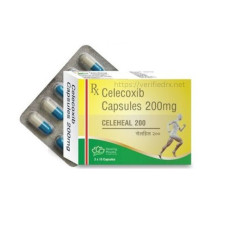-
ADHD
- Antacid
- Anti Allergic
- Anti Anxiety
- Anti Depressant
- Anti Inflammatory
- Anti Parasite
- Antibiotics
- Anticonvulsant
- Antidiabetic
- Antifungal
- Antipyretic
- Antiviral
- Asthma
- Blood Pressure
- Cancer Treatment
- Cholesterol
- Cialis
- Gastrointestinal
- General Health
- Hair Loss
- Levitra
- Men's health
- Pain Relief
- Quit Smoking
- Viagra
- Vitamins
- Weight Loss
- Women's health
Available
WHAT IS THIS MEDICATION FOR?
Celeheal 200mg is a non-steroidal anti-inflammatory drug, prescribed for rheumatoid arthritis, osteoarthritis, ankylosing spondylitis, juvenile arthritis, menstrual pain, and other pain.
HOW DOES IT WORK?
Celecoxib blocks chemicals that cause pain and swelling.
HOW TO USE?
The recommended oral dose is 200 mg per day administered as a single dose or as 100 mg twice daily. It comes as a capsule to take by mouth, with food.
SIDE EFFECTS:
Headache. Belly pain or heartburn. Upset stomach or throwing up. Diarrhea.
WHAT TO DO IF I MISS A DOSE?
Take a missed dose as soon as you think about it. If it is close to the time for your next dose, skip the missed dose and go back to your normal time. Do not take 2 doses at the same time or extra doses. Many times this drug is taken on an as needed basis.
PRECAUTIONS:
Do not take Celecoxib if you have a history of allergic reactions (swollen eyes or mouth, difficulty breathing, rashes) to similar medicines such as aspirin, etoricoxib, diclofenac, mefenamic acid, ibuprofen, indomethacin; and also to sulfa medicines such as probenecid and cotrimoxazole. Always ask your doctor or pharmacist if you are not sure. Celecoxib may not be suitable for you if you have a history of heart, kidney, liver or blood clotting problems, stroke, high blood pressure, bowel inflammation or stomach ulcers.
WHEN DO I NEED TO SEEK MEDICAL HELP?
If you think there was an overdose, call your local poison control center or ER right away. Signs of a very bad reaction to the drug. These include wheezing; chest tightness; fever; itching; bad cough; blue or gray skin color; seizures; or swelling of face, lips, tongue, or throat. Very bad belly pain. Very bad headache. Very upset stomach or throwing up. Very loose stools (diarrhea). Very bad swelling or pain of hands or feet. Chest pain or pressure. Change in strength on 1 side is greater than the other, trouble speaking or thinking, change in balance, or blurred eyesight. A big weight gain. Black, tarry, or bloody stools. Blood in the urine. Any bruising or bleeding. Yellow skin or eyes. Not able to eat. Feeling very tired or weak. Any rash. Side effect or health problem is not better or you are feeling worse.
CAN I TAKE IT WITH OTHER MEDICINES?
Inform your doctor and pharmacist if you are taking any of the following medicines: - aspirin. - medicines that affect blood clotting such as warfarin, clopidogrel, dipyridamole, heparin. - an antifungal medicine known as fluconazole. - lithium. - steroids such as dexamethasone, prednisolone. - TB medicine known as rifampicin. - Always inform your doctor and pharmacist if you are taking any other medicines, including herbal tonics, supplements and medicines that you buy without a prescription.
FOOD RESTRICTIONS:
Avoid Alcohol.
HOW TO STORE:
Store it at room temperature (25°C)
PREGNANCY CATEGORY:
Category C: Animal reproduction studies have shown an adverse effect on the fetus and there are no adequate and well-controlled studies in humans, but potential benefits may warrant use of the drug in pregnant women despite potential risks.
THERAPEUTIC CLASSIFICATION:
Nonsteroidal Anti-Inflammatory Drugs (NSAIDs), Non-Opioid Analgesics & Antipyretics.



